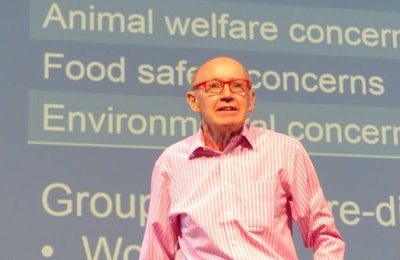
Prof. David Hughes, speaking at the Biomin World Nutrition Forum in Vancouver, Canada, on October 13, presented on what is and will be driving the global protein economy.
Animal protein demand is slowing down. From 2020 to 2030 there will be an increase in demand of 17 percent, lower than previous decade’s figures. However, challenges remain, as there will be more volatility in the markets. In addition, as long as there is no more income for people and the population continues to grow, there will not be more production of animal protein.
Another fundamental aspect, Hughes said, is that you have to see the big picture with and without China, since this country has a disproportionate impact. With a single extra kilogram that every Chinese citizen eats, everything is affected. And if they eat one less kilogram, the market may collapse.
Here are five major points driving the protein economy:
1. Chicken or fish?
Hughes said that normally, when we speak of animal protein, fish and seafood are not considered, but clearly it represents an option. For him, the No. 1 animal protein is fish and seafood, along with poultry protein. An example of this is salmon, which has done very well in the last 6 to 7 years. The battle is going to give at the feed conversion rate level between aquatic species and poultry.
2. Population
Another interesting aspect is that there are countries that are decreasing in population, like Japan, with one million people less a year, and along with this population structure, more old people and fewer young people. By 2030, China will follow the same path in the structure of the population.
What can we expect? In developed countries meat consumption decreases, especially red meat. Women and older people (over 65 years) are the most likely to decrease their consumption.
Then, within the population structure are the so called "millennials," who sometimes do not know what a proper dinner is, and which increasingly eat more meals a day and not the traditional three. In the current generation is fashionable to have "flexitarian" diet: those who perhaps do not eat meat two or three times a week, not because they are vegetarians, but for other reasons, such as health or variety in food.
3. Interest groups
Interest groups want us to eat less meat. It is a big move and they have a strong impact. Some governments also push for this. But in this, there is a lot of information and misinformation, especially when relating meat production with the environment.
4. Socialization and meal preparation time
What impact can it have that 40 percent of meals in the U.K. are eaten alone, without company?
We used to go to the supermarket to buy ingredients. Now we buy solutions, which impacts decisions. People want solutions, especially in Europe, where there are many one-person households. In this part of the world single protein servings are sold in the supermarket. Eating out and eating in are becoming one thing, when full dinner solutions are sold.
5. Consumer behavior
The complexity of consumer buying behavior is increasing. Marketing is filled with adjectives for food products. How do you want your chicken? Antibiotic-free, vegetarian diet, with omega-3, free range and a long list of categories.
But the question remains: Will the consumer be willing to pay more for green products? Hughes answered with an emphatic no. Consumers may be asked if they want free-range chickens, but when you have a choice and you see that it costs more, cosumers will go for the least expensive.


















